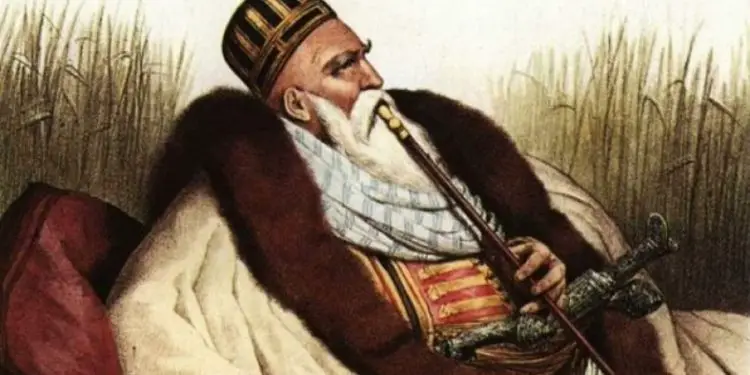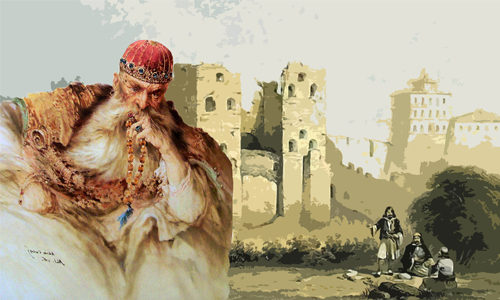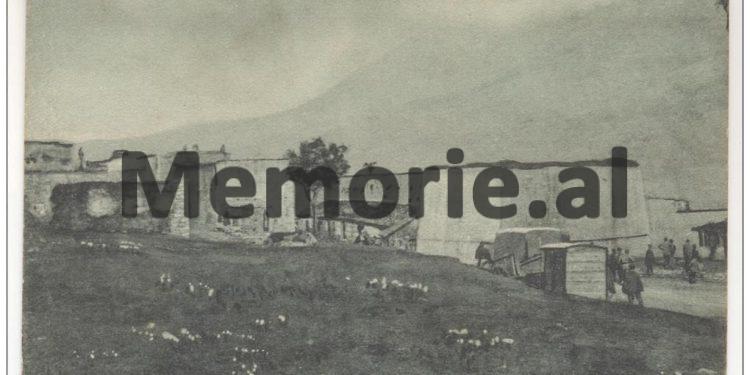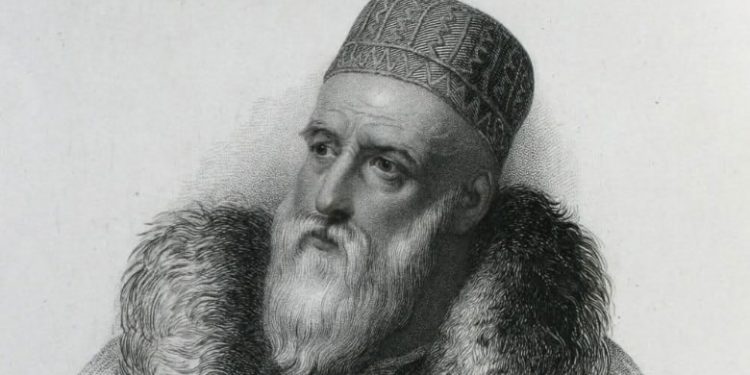Memorie.al/The studies of the American professor George Ticknor reveal another relationship between Byron and Ali Pasha Tepelena – Memorie.al / Lord Byron, the famous English poet, continued to maintain his feelings for Albania even when he was in faraway London or Vienna. In the aristocratic salons of the time, he would recite poems dedicated to this country, unknown to Europe, which he had discovered simply out of a passion for travel. The figure of Ali Pasha Tepelena, the pasha whom he beautifully described in his verses, would become a mystical figure that would arouse curiosity not only among the ladies in their contemporary dresses but also among many different personalities of the time, who, in one way or another, managed to reach Albania.
A simple journey by Lord Byron and the way he presented this journey in his songs would lead to the fame of the Albanian nature, and especially that of a pasha whom he had met and who had been generous to the passionate young man of letters, crossing borders.
Scholars of that period, as well as people fascinated by the wonderful details of history, reveal other interesting details from Byron’s life after leaving Albania.
If we refer to the few data found in the preserved archives of the poet’s descendants, the latter had not only not forgotten Albania but continued to maintain correspondence with the Albanian pasha until his last days. His return to England could not erase from the young man’s mind the hours spent in Albania, the acquaintance, and the conversations with the pasha of the Albanians.
If a thorough study is made of all the details that suggest Byron and Ali Pasha Tepelena had continuous correspondence, we might find details that could be important, not only for the characters of the two well-known personalities—the two letter-exchangers—but also for that period of concerns that might have been expressed in these letters.
In those few details found in the archives of Lord Byron’s family, it is noticeable that he was interested in all the people who accompanied his journey to Greece and Albania.
Byron sought to know not only about the famous pasha but also about his personal guard, Vasili, and his relationship with one of the cousins of the Macri sisters, Dudu Roque, the interpreter given to him in Ioannina, Andreas Zantachi, as well as the Muslim Dervish Tahiri, another of his guards from the Albanian lands.
The figure of Byron, this important poet in world literature, well studied even in Albanian schools, becomes even more attractive to us when we learn of his persistence in learning more things from the country that had once touched him.
Even though he was never able to travel again to the Pasha’s castle, as we see him express in a letter addressed to him, he never stopped seeking information about Albania. Every person who had accompanied his journey to Albania would be memorized by him to make his descriptions of Albania more complete for his close friends in the cold London of those years.
Many contemporary scholars are convinced that in the archives of his descendants, details can be uncovered that could make his entire relationship with Ali Pasha more complete, ever since he left Albania in the spring of 1810. All the details that would reveal this relationship between two important men in the history of their countries would be beautiful information, offering a different side of these two characters.
The Letters
On September 8, 1813, Byron wrote to his friend, Thomas Moore. “Yesterday I received a letter from Ali Pasha sent with Dr. Holland, who has just returned from Albania. The letter is in Latin and begins with ‘Excellentissime, nec non Carissime’ and ends with the description of a weapon he wishes to be made for him. It is signed Ali Vezir.
What do you think he has been doing all this time? Holland tells me that last spring he took an opposing city, which 42 years ago had shamed his mother and sister. He took the city, selected the survivors, about 600 people, and killed them all in front of him. However, he spared the others and controlled himself-more than I would do. That was the news about our dear friend.”
In this letter, it is clear that the communication between Byron and Ali Pasha had been ongoing for some time. The English poet continued to look with curiosity at everything happening in faraway Albania, where “his friend Ali” was not always on the favorable side. Since Byron sent this letter to his friend, Thomas Moore, it suggests that Ali Pasha was a known figure not only to those who had read Byron’s verses throughout Europe but also to his closest friends.
Conversations about him must have been continuous, and friends discussed what was happening in the country that Byron described so well in terms of its natural sensibilities. The love with which Byron had written about Albania led other important figures of European life to arrive in this almost previously unknown Balkan country. Byron managed to inspire journeys to Albania for a series of travelers, artists, agents, and adventurers, who sought to stop, just like Byron, at the Pasha’s court.
It is a known fact that anyone who writes about the period of European travel in the territories of Greece, Albania, and Macedonia in the 19th century has the dominant figure of Lord Byron at the center of attention. Although journeys to Turkey and Greece had been hampered for a time due to Napoleon’s European wars, thanks to the persistence of a Society of young aristocrats called the “Dilettanti Society,” a number of architects, archaeologists, writers, and adventurers undertook journeys to these territories, with the aim of studying the ancient monuments, peoples, culture, and traditions of these countries.
A group of “Levantine madmen,” just as enthusiastic and persistent as Byron, would follow his footsteps through Athens, to the home of the Makri sisters, to the ancient monuments of Nicopolis, or would seek to meet the enigmatic figure of Ali Pasha Tepelena, who, thanks to the poem “Child Harold’s Pilgrimage” (which had sold 20,000 copies in one day), was already one of the best-known figures in European intellectual circles.
Byron’s Gift to Ali Pasha
Details about the relationship between Ali Pasha Tepelena become even more interesting if we refer to the manuscripts left behind by the well-known American professor, George Ticknor. The Harvard Professor, founder of the first Boston library, and friend of a number of American personalities, including Thomas Jefferson, who was traveling through Europe, sought a private meeting with Byron during his visit to England. Ticknor must have been passionate about history and travel, considering his movements in search of greater knowledge about Albania.
After reading Byron’s verses about Albania, he sought to meet Byron to discuss more closely everything the poet had felt when he put those wonderful feelings about an unknown country onto paper. All information obtained from that period indicates that the well-known professor and the poet met in the presence of Ticknor’s friend, Edward Everett, the future President of Harvard, on June 23, 1815, and the focus of the conversation was Ali Pasha.
Years later, Ticknor would describe the meeting with the poet, clearly underlining the feelings offered by him for Albania. From this meeting, the professor understood that this country, seen by chance by the poet, was an island where he absolutely had to stop, even just once during his life. “He told me numerous details about the history, feelings, thoughts, and impressions of the difficulty under which he wrote ‘Child Harold’,” is stated in the memoirs left behind by Ticknor.
During this meeting, the professor asked the poet for a signed recommendation to give to the Pasha when he met him in Albania. It seems Byron liked the unique ideas fueled by the love of this professor, who sought to discover a very little-known part of the Balkans, and even more so to visit a Pasha whose fame was already known throughout Europe, thanks to the verses of this poet.
Byron Writes to Ali Pasha
It seems that the meeting between Ticknor and Byron, besides conveying extraordinary emotions from the poet’s journey to faraway Albania, further strengthened the American professor’s desire to travel to Albania. To make communication with the Albanian pasha easier, he asked Byron for a recommendation, informing the Pasha about his visit and his person.
It seems Byron liked the idea of this rare visitor, and wrote a recommendation, where, among other things, he told the Pasha that he had sent a gift with the American professor. The letter is dated June 25, 1815. “Vezir – I am honored by Your Highness’s letter sent with Dr. Holland. I am happy to hear of your health and well-being – I hope it will continue for many years.
An American gentleman (Mr. Ticknor) has promised to bring you a present from me to Your Excellency, a very special weapon (the use of which he will make known to you) which I would be very honored if you would accept. – I hope that one day I will be able to visit Albania again – a country – for which the memories of the care for foreigners you show are very dear to me. With the greatest respect I remain your servant,” states the letter Byron addressed to Ali Pasha.
In this letter, the poet’s respect for the Albanian Pasha is clearly felt, the impressions he still held for Albania, and the desire to set foot again in this country, which he discovered by chance. This letter is a sufficient detail showing that the correspondence between Ali Pasha and Byron was present, regardless of the intensity of the letters, which, considering the time must have been rare, whenever a traveler or friend of both parties happened to travel to the countries where Byron and the Pasha lived.
The documents that have arrived from that time do not confirm whether the honored professor, a personality with an important role in American life, realized his visit to Albania, or whether he managed to meet the Pasha of Ioannina. But these details become interesting in the times we live in, also due to the fact that important personalities of the American life of the time were interested in the Albanian Pasha, figures like Prof. Ticknor, Everett, and Joseph Coolidge, the future son-in-law of the American President, Thomas Jefferson.
But his interest and the journey to London to meet Byron, where the topic of conversation was Albania, clearly indicate the importance for Albania of the perhaps accidental journey of a young English poet, but whose hospitality and wonderful Albanian nature inspired him to show the world through poetry, his only weapon, that somewhere far away, in a country that almost did not exist in the core of aristocratic thought, lives a country with a special pasha.
Even though Byron wrote those verses precisely by listening to his inner voice, they turned into Albania’s first opening to the world, making it a positive protagonist and increasing the curiosity of well-known people of the time to arrive there.
George Ticknor becomes an interesting character for Albania, due to the memories found in his archive about Albania. His meetings with Byron, to receive his blessing to travel to Albania, and the way he sought to explore the country which he had only known through the verses of a poet, make his figure more attractive. While if we look at what is written about Ticknor, he is a writer, co-founder of the first public library in Boston. / Memorie.al















